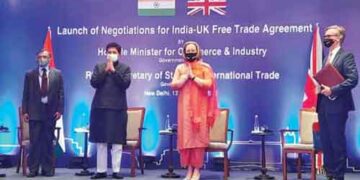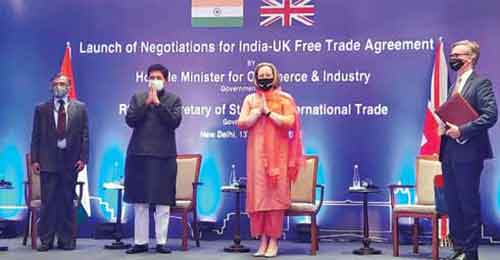 The UK-India Free Trade Agreement is made in heaven as friendship flourishes when we share each other’s values. Both countries believe in human freedom and the rule of law where everyone is equal.
The UK-India Free Trade Agreement is made in heaven as friendship flourishes when we share each other’s values. Both countries believe in human freedom and the rule of law where everyone is equal.
The UK and India are secular and democratic countries with equality for all enshrined in their constitutions regardless of race, religion and gender. One is the oldest and the other is the largest democracy of the world.
Unlike China, India does not work to undermine British interests globally, nor do they suppress their people like the Chinese Communist Party. India is a stable democracy, and there is no danger of a military coup or the political upheaval of the type we have just witnessed in Myanmar.
Loyalty in the wars We have over two centuries of shared history and are no strangers to one another. Indians proved their loyalty to the King and the Empire in both the great wars and helped preserve the world’s freedom. Indians also came to rebuild Britain after devastating wars and worked in factories, transport and hospitals etc.
India is already the second-biggest investor in the UK, and the wealthiest families in Britain are Indians. The free trade agreement between Britain and India will be equivalent to having the same with more than ten countries as it will be between the world’s 4th and 5th largest economies.
Given the size of the Indian market, it will prove to be the Mother of all Free Trade Agreements. It will unleash economic growth in both countries to benefit the world. British companies are ahead in terms of innovation, technology and organisational skills.
Indian market growing
India can pass low tech, labourintensive and repetitive work to India whilst focusing on the core business of innovation and the development of high-tech industries. The trade within Britain and with Europe is not growing significantly whereas the Indian market is growing approx. 6% to 7% per annum and given the market size, this growth can be substantial. By linking up with Indian companies, British companies can drive themselves out of sluggish growth, and Indian companies can move to the next level instantly. For example, India is the largest buyer of defence equipment in the world because its two hostile neighbours and Britains arms industry is in decline.
By working together, British firms can manufacture defence equipment in India, gain a considerable market locally, and grow their export potential. The same goes for the pharmaceutical industries, films, energy and so on. India can offer British firms the scale of production needed to meet the global need as the coronavirus pandemic has already shown us.
Motivated workforce
More importantly, we cannot get a more motivated workforce than in India because of the tough competition for employment that makes people work harder. We can see how Indians have excelled throughout the world against difficult circumstances. They are now running most of the bluechip companies in the world.
English language is the official language of India, and as a result, it is easy for British companies to work in India. JCB is a prime example. By moving production of their earthmoving equipment, JCB not only has captured the local market but is also able to export their equipment economically produced in India to 90 countries.
More importantly, India’s retail sector also is growing due to the exposure of masses to television, satellite, and the internet. India now has a large middleclass population, probably larger than that of the US and or Europe combined. Besides, Indians now have more disposable income as salaries are directly in line with the West in many sectors.
Western product demand
The India diaspora of over 30 million strong settled in over 100 countries is travelling to India more frequently than ever before, thus increasing demand for Western products. Income, International travel and media awareness have significantly increased the demand for Western products in India.
In Britain, we have iconic brands from Scotch whisky to biscuits and from chocolates to designer clothes with a reputation for quality, taste, and Indians for generations have grown up enjoying them. To grow businesses, one needs to merge, acquire or forge strategic alliances with companies.
As I only had 2 Pounds of capital to start my business, I could neither acquire a company nor did anyone want to merge with me. I was left with the third option; to forge strategic alliances with likeminded people in a similar situation. The logic is straightforward. When one cannot afford to fight the competition alone, one needs to join forces to become a credible force. Besides, one needs local knowledge which is crucial in establishing oneself in any market easily and quickly and without much cost.
Win-win situation
When we share our profit, they say we also share our costs but double our strength. By having local partners on the ground, we could export our products to many countries simultaneously with staggering results. This is how we have entered 130 markets in just 25 years by plugging into our strategic partners’ already established distribution channels. The UK-India Free Trade Agreement is a win-win situation for both countries.
Now challenges in India and how to overcome them. First of all, India has recently opened its market to the world and rules and regulations are still being perfected. Red tape, duty and tariffs are still very high, but are set to come down gradually. With Free Trade we can overcome such challenges.
Finally, the UK-India Free Trade Agreement will prove important for the world security. Only India has the population to act as a counterweight to the growing Chinese threat to the world.

















100% agree with all the contents